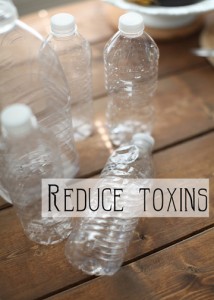 Plastic is everywhere: in bottles, microwaving packaging, yogurt containers, drinking straws and many other places – even your toothbrush! Unfortunately, plastic is full of harmful toxins, and not just Bisphenol A (BPA) which can disrupt your endocrine system. In fact, even BPA-free plastic leaches chemicals that also act as hormone disruptors.
Plastic is everywhere: in bottles, microwaving packaging, yogurt containers, drinking straws and many other places – even your toothbrush! Unfortunately, plastic is full of harmful toxins, and not just Bisphenol A (BPA) which can disrupt your endocrine system. In fact, even BPA-free plastic leaches chemicals that also act as hormone disruptors.
Toxins in plastic other than BPA include Bisphenol S (BPS), a BPA substitute, phthalates and triphenyl phosphate (TPP), all of which are known to affect the endocrine system.
How to Reduce Your Exposure to Plastic
While it’s impossible to completely remove plastic from your life, here’s how you can lessen your dependence on it.
Quiz: Is Your Body TOXIC? Take the Test...
(get your free personalized report)
1. Pay attention to packaging
Avoid buying items that are packaged in plastic. Buy food and drinks in glass or cardboard bottles and containers. Purchase detergent that comes in a cardboard box.
2. Avoid processed foods
Processed foods are more likely to be wrapped in plastic than natural foods are. If you can, shop at the butcher or greengrocer instead of the supermarket, and have your items wrapped in wax paper or placed in a paper bag.
By avoiding processed foods, you won’t just be avoiding plastic; you’ll be avoiding artificial colors, artificial flavors, preservatives and excess sugar and salt too.
3. Don’t microwave your food in plastic containers
Use glass or ceramic containers, and cover your food with a paper towel.
4. Carry your water in a canteen
Drinking water is essential for good health, and many people don’t drink enough. Drinking water from a plastic bottle isn’t healthy, however. To keep yourself hydrated while avoiding toxins, carry your water in a reusable canteen.
Quiz: Is Your Body TOXIC? Take the Test...
(personalized report)
5. Squeeze your own fruit juice
Instead of buying juice in a plastic bottle, buy fresh fruit and make your own juice. Processed orange juice is high in sugar and has some of the nutrients removed during processing. It’s better to make and drink your own.
6. Use cloth shopping bags
Instead of using plastic bags, place your shopping in a reusable cloth bag. Be careful: the use of reusable bags has been associated with infection, so be sure to wash your bags.
7. When ordering take-out, bring your own container
Many restaurants package take-out orders in styrofoam; a type of plastic. Bring your own container and ask for it to be filled with the food you order. You can also use your own container if you’re dining at the restaurant but want to take a doggy bag home.
8. Avoid plastic cutlery
Use stainless steel knives, forks and spoons. The health benefits will be worth the time you spend washing them.
9. Skip the straw
Straws are made of plastic, and they’re unnecessary. Drink straight from the glass.
10. Don’t use non-stick cookware
Non-stick cookware often has a plastic coating. Cook with ceramic or cast iron cookware and coat with healthy oils, such as flax or olive oil, to keep food from sticking.
11. Wear natural fibers
Synthetic fibers are made of plastic, and the toxins in them can get into your skin.
12. Avoid giving children plastic toys
The toxins in plastic can be especially harmful to children, whose bodies are developing. If you have children, give them toys made of paper, cloth, wood or metal.
If you must use plastic containers, you can help prevent harmful toxins from leaching out. Avoid heating plastic containers, leaving them out in the sun or placing hot foods or beverages in them. Clean them gently and avoid the use of abrasives.
Avoiding plastic is not only good for your health; it’s good for the environment. When plastics are manufactured from petrochemicals, many pollutants are released. Discarded plastic takes a long time to biodegrade – landfills are saturated with plastic products.
When you cut down on plastic use, you’re being good to yourself and to the planet.
Additional sources:
BPA replacement also alters hormones, Scientific American
Endocrine disrupting chemicals in indoor and outdoor air, Atmospheric Environment
The Scary New Evidence on BPA-Free Plastics, Mother Jones
Triphenyl Phosphate, Environmental Working Group Skin Deep Database

